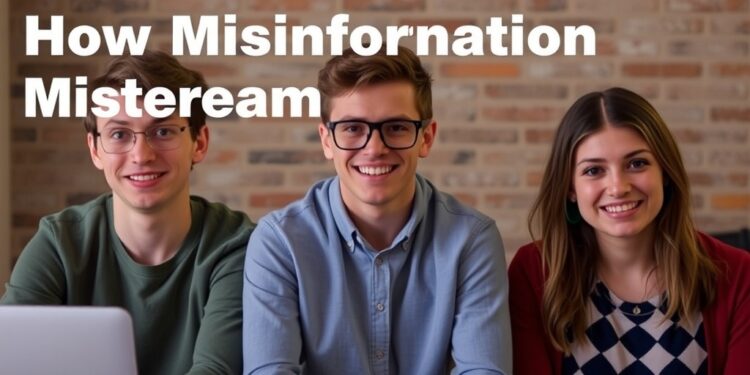In today’s digital age, social media platforms have emerged as powerful tools for information dissemination, particularly among younger audiences. TikTok, in particular, has gained widespread popularity, becoming a vibrant space for discussions about mental health issues, including attention-deficit/hyperactivity disorder (ADHD). However, a recent study conducted by researchers at the University of British Columbia reveals a concerning dichotomy between the ADHD-related content that garners significant views on TikTok and the clinical understanding of the disorder. As TikTok creators share anecdotes and personal experiences, there is a profound risk that their narratives may not accurately represent the complexities of ADHD, leading to misconceptions among viewers.
The study highlights that less than 50% of assertions regarding ADHD symptoms in the top 100 most-viewed TikTok videos align with established clinical guidelines for diagnosis. This discrepancy presents a twofold challenge: while TikTok serves as a platform for raising awareness and reducing stigma, it may also propagate misunderstandings about ADHD. Anecdotal content, devoid of professional context, risks misleading young adults regarding the nature of the disorder, potentially leading to self-diagnosis or incorrect assumptions about their mental health.
ADHD, one of the most prevalent neurodevelopmental disorders, manifests in difficulties with attention, hyperactivity, and impulsive behavior. It is estimated to affect approximately 3% to 7% of adults worldwide, and its symptoms often persist into adulthood. Understanding these nuances is vital, as the personal experiences shared on platforms like TikTok do not universally apply. The study emphasizes the importance of nuance, stating that many TikTok creators fail to clarify that their experiences may not be representative of those with ADHD, which can distort viewers’ understanding of the disorder.
The impact of consuming ADHD-related content on TikTok is significant, revealing that young adults who engage with this type of material tend to overestimate both the prevalence and severity of ADHD symptoms in the general population. This situation is exacerbated by the fact that participants who frequently watch ADHD content on TikTok are also more likely to endorse and recommend these videos, despite their questionable reliability. The unfiltered nature of social media can create an echo chamber where misinformation thrives and is perpetuated.
The researchers employed a systematic approach, involving two clinical psychologists to evaluate the accuracy, nuance, and overall quality of the top 100 TikTok videos under the hashtag #ADHD. Their analysis revealed a marked contrast in perceptions of video quality between mental health professionals and the young adult audience. Psychologists rated the most accurate ADHD-related videos with a score of 3.6 out of five, while young adults assigned a lower rating of 2.8, showcasing a gap in discernment. Conversely, the least reliable videos received ratings of 1.1 from psychologists and a relatively favorable rating of 2.3 from young adults, suggesting that misinformation is often accepted at face value without proper scrutiny.
The implications of these findings underscore a critical need for mental health professionals to engage more actively in the discussions that unfold on social media platforms. By stepping into this space and providing expert-backed content, psychologists can help counter the proliferation of misinformation surrounding ADHD. In a digital landscape that increasingly shapes perceptions of mental health, professionals have an opportunity to ensure that accurate, evidence-based information reaches a wider audience.
Moreover, the study points out that some young adults turn to platforms like TikTok due to barriers in accessing traditional mental health care, including stigma or negative experiences with professionals. As social media becomes a space for community building, it is essential that this resource does not replace evidence-based care. The wealth of information available online can serve as a complement to professional guidance, rather than a substitute.
Greater awareness is necessary for individuals considering an ADHD diagnosis, emphasizing the importance of consulting with healthcare providers who can navigate the diagnostic complexities. Mental health is multifaceted, and symptoms resembling ADHD can often stem from other conditions, such as anxiety or stress. The researchers encourage young adults to critically assess their experiences and consider potential underlying factors before jumping to conclusions about ADHD.
Ultimately, the study reflects a broader trend in the intersection of social media and mental health. As platforms continue to evolve, the responsibility lies with both content creators and mental health professionals to strike a balance, ensuring that the conversation around ADHD is not only engaging but rooted in accuracy and compassion. While anecdotes shared on TikTok can foster connection and community, they must be accompanied by the acknowledgment that ADHD is a clinically defined condition requiring thoughtful discourse informed by scientific understanding.
In summary, although social media platforms like TikTok have transformed the way mental health discussions unfold, it is vital that viewers approach this information critically. Professional engagement on these platforms is paramount to foster an environment where accurate information prevails over misinformation. By working collectively, mental health professionals and content creators can ensure that the narratives surrounding ADHD are both empowering and informative, paving the way for a more informed and understanding society.
Subject of Research: People
Article Title: A double-edged hashtag: Evaluation of #ADHD-related TikTok content and its associations with perceptions of ADHD
News Publication Date: 19-Mar-2025
Web References: PLOS One Study
References: N/A
Image Credits: N/A
Keywords: ADHD, TikTok, mental health, misinformation, clinical psychology, neurodevelopmental disorders, young adults, social media.




